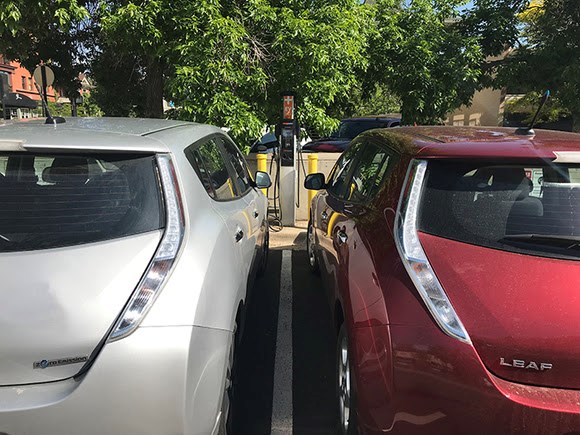This content was originally published by the Longmont Observer and is licensed under a Creative Commons license.
The Board of County Commissioners approved Resolution 2018-120 on Tuesday, Nov. 13, pledging to be a GoEV County and to develop a transportation electrification plan with implementation strategies.
GoEV is a movement supported by the Southwest Energy Efficiency Project (SWEEP), the Sierra Club, Conservation Colorado, Clean Energy Economy for the Region (CLEER), and Colorado Public Interest Research Group (CoPIRG) which encourages local governments to pledge to develop electric vehicle action plans.
The petroleum-fueled transportation sector is now the largest source of greenhouse gas emissions in the nation and is a contributing factor to air pollution and climate change, threatening the health of Boulder County residents and the sustainability of our planet. The transportation sector needs policy support to move toward adoption of clean energy technology, including electric vehicles (EVs), that reduces our dependence on foreign fuels and supports a healthy environment and economy.
"It is clear that our transportation system needs to not only be cleaner and more environmentally friendly but also less costly in regards to maintenance costs," said Commissioner Elise Jones. "Electrifying our vehicles is a solution that solves these needs and Boulder County is committed to leading this change."
George Gerstle, Boulder County Transportation Director, commented, "We have been working to electrify our county fleet because it saves taxpayer money over the life of the vehicle. Electric vehicles require less maintenance, use less fuel, and are better for the environment. As more vehicle models become available, we will be moving towards electrifying our pickup trucks, vans, and heavier equipment. We’ll also be advocating that RTD and other transportation providers, like Lyft and Uber, use electric vehicles."
The term “electric vehicle” includes Battery Electric Vehicles, Plug-in Hybrid Electric Vehicles, and Hydrogen Fuel Cell Vehicles. The electrification of cars, trucks, and buses is needed in order to achieve deep reductions in carbon pollution, and the benefits grow over time as utilities transition to higher levels of renewable energy. Boulder County will not be able to meet GHG emission reduction goals without electrifying the transportation sector.
Some of the goals Boulder County is pledging to work towards include:
- 100% of new, light duty vehicles purchased by the county shall be electric vehicles when possible
- Supporting the electric vehicle charging station infrastructure needed to accommodate the transition to electric fleet vehicles.
- Working with the community on programs, policies, incentives, and regulatory approaches to transition 30% of all residential, business, and municipal vehicles within the county to zero emissions by 2030, and 100% of all vehicles by 2050.
Boulder County is dedicated to being a leader in the use of clean energy, establishing policies and programs that conserve energy, promote sustainability, and support Colorado’s goal of nearly one million EVs on its roads by 2030. The residents of Boulder County have shown their support for reducing GHG emissions through overwhelming support of the county sustainability tax, and by having the highest level of EV adoption of any county in Colorado.
For more information about the GoEV initiative, visit https://www.goevcity.org/. For more information about the county’s electric vehicle goals, contact Brad Smith in the Sustainability Office at [email protected] or 720-564-2720.


.jpg;w=120;h=80;mode=crop)
